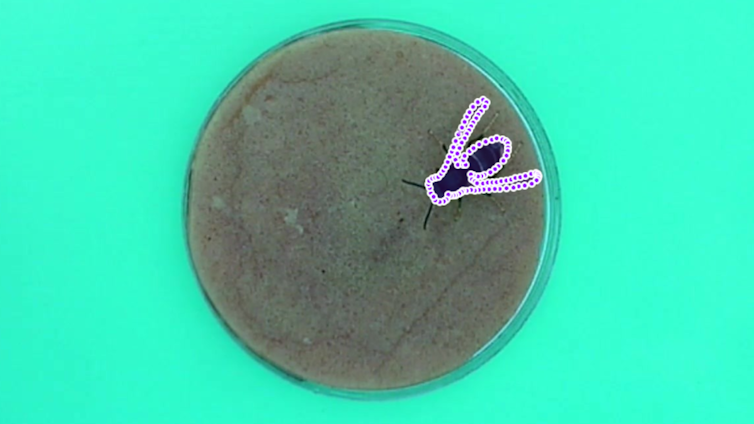The island of Jersey is understood for its picturesque landscape and mild climate. However, on account of its proximity to the European continent, it’s exposed to an invasive predator: the Asian hornet. . This is bad news for the island’s wildlife, but makes Jersey a really perfect location to check latest methods of controlling the hornets.
Using the island as a test bed, our team of biologists and data scientists have developed an AI system that may routinely detect Asian hornet invasions of recent regions, enabling their eradication before they gain a foothold. The VespAI system identifies Asian hornets with over 99% accuracy, as recently demonstrated Results published within the journal Communications Biology.
This early warning system is vital since the Asian hornet – also referred to as the yellow-legged hornet – is spreading quickly Threats to biodiversity. The species, originally from Southeast Asia, has invaded Europe, East Asia and the United States inside 20 years, preying on honey bees and other necessary species pollinators.
To address the issue, VespAI uses deep learning technology, a computational method inspired by the human brainto visually discover Asian hornets, capture images and send automated alerts to the beekeeper, landowner or government official using the system.
The setup is straightforward. A sponge impregnated with hornet attractant – a tasty mixture of sugar and fruit extracts – is placed under a small camera that takes pictures of visiting insects as they land to feed. These images are then analyzed by the system’s AI algorithm, allowing the monitor to discover nearby Asian hornets perfect accuracy.
VespAI fills an urgent need for the UK because the UK stands on the sting of the European hornet invasion front. The incursion of Asian hornets into the UK began in 2016 and is now coming to a annual basis. While the national Eradication strategy With the hornets’ ability to completely establish themselves limited, 2023 was a very bad 12 months with a record 72 nests is discovered.
Peter J Kennedy, Provided by creator (no reuse)
In Europe, traditional methods reminiscent of bait traps are the primary line of defense. However, these kill a major variety of native insects, including many pollinators. Furthermore, killing traps make little sense Reducing hornet numbersas colonies proceed to survive unless the Queen is destroyed.
By stopping damage to visiting insects, VespAI offers a definite advantage over trapping. Additionally, all Asian hornets detected by the system remain alive so that they will be traced back to the nest. This is vital since it is the one proven way Destroy colonies.
A key reason for the hornets’ success is the issue of detecting their initial invasion of recent regions. New colonies start with only a single queen but can produce tons of more queens inside a 12 months, resulting in exponential growth in numbers.
As a results of this rapid spread, hornet populations often form before or shortly after they’re noticed by humans, making eradication nearly not possible. Since early detection of invasions relies on sightings by the general public, there’s also a high risk of mix-up. In the UK, it accounts for just 0.06% of the hundreds of Asian hornet reports submitted annually correct identifications.
A scalable solution
To test the effectiveness of VespAI, we conducted rigorous field trials on the island of Jersey, where Asian hornet incursions from France are common. Working with the Jersey Asian Hornet Group and the island government, we’ve got deployed prototype systems in areas where Asian hornets, European hornets and other insects are abundant.
We then fastidiously analyzed the hundreds of images collected by the prototype systems. We manually checked every one to make sure that the AI algorithm accurately identified all Asian hornets without misidentifying other insects as hornets.

University of Exeter, Provided by creator (no reuse)
So far our results have been promising. VespAI detects Asian hornets with over 99% accuracy, a major advantage over previous methods. While this technology remains to be in development, our experiments suggest that the system could transform the way in which Asian hornets are managed in vulnerable regions reminiscent of the UK and US.
Remarkably, Britain’s first confirmed Asian hornet of 2024 was recorded in March, significantly sooner than usual, and the high variety of nests in 2023 suggests this 12 months will be the most difficult yet. Further testing of the VespAI system will happen within the UK over the following few months as we work with government authorities to strengthen eradication efforts at this important moment.
This article was originally published at theconversation.com





